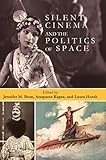Silent cinema and the politics of space / edited by Jennifer M. Bean, Anupama Kapse, and Laura Horak.
Material type: TextPublication details: Bloomington : Indiana University Press, 2014.Description: x, 346p. ; 23cmISBN:
TextPublication details: Bloomington : Indiana University Press, 2014.Description: x, 346p. ; 23cmISBN: - 9789386552679
- 791.4309 BEA 22
| Item type | Current library | Call number | Status | Date due | Barcode | Item holds | |
|---|---|---|---|---|---|---|---|
 Book
Book
|
Calcutta | 791.4309 BEA (Browse shelf(Opens below)) | Available | IIMC-0146478 |
In this cross-cultural history of narrative cinema and media from the 1910s to the 1930s, leading and emergent scholars explore the transnational crossings and exchanges that occurred in early cinema between the two world wars. Drawing on film archives from around the world, this volume advances the premise that silent cinema freely crossed national borders and linguistic thresholds in ways that became far less possible after the emergence of sound. These essays address important questions about the uneven forcesଓgeographic, economic, political, psychological, textual and experientialଓthat underscore a non-linear approach to film history. The 'messiness' of film history, as demonstrated here, opens a new realm of inquiry into unexpected political, social and aesthetic crossings of silent cinema.
There are no comments on this title.

